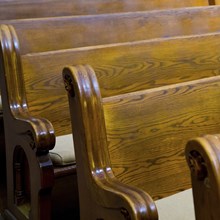My favorite burrito is nearly 1,000 calories and has almost 40 grams of fat. Thanks to the company website, I was able to check out the nutritional value (or lack thereof) of my typical lunch at a popular restaurant. I was shocked an appalled—especially because I assumed that the burrito was healthier than other fast food options. I was wrong.
The health disaster discovery was made after a friend gave me some advice in the weight room. "Bill," Dennis said, "If you really want the full impact of weight training, you need to watch what you eat as much you work on your lifting routine." After complaining that it is hard to eat healthy, quick, and cheap, I was encouraged to go online and check out the menu options. I was surprised how many good options are on fast food menus and alarmed at all the bad ones I normally consumed. Dennis reminded me that regular exercise might build muscle, but if I am following it up with junk food, I will not get the full benefit.
It boils down to this: you cannot hit the gym and the French Fry Hut and expect to see dynamic physical change. That makes sense, of course, when we really think about it. But for some reason we think we can take the same approach with our spiritual lives.
Too many church dwellers figure that an hour a week in a worship service will eventually turn them into a spiritual dynamo, or at least a strong believer. They are often disappointed when they realize the truth—that our spiritual lives need to be holistic.
That's why connecting the weekend message to a spiritual community and to our personal devotions has exponential power—much like a great workout routine matched with a healthy diet. An all-church campaign is like that. It combines the intensity of the weekend message with the community and trust of a small group.
The Benefits
There are three significant advantages to an all-church emphasis:
- Focus. Be honest, do you remember the last sermon you heard? After laboring on a message for hours, the preacher delivers volumes of significant information in half an hour. Within a day, the hearers forget most of the message. This is tragic when you consider the importance of the message.
But when a sermon is linked to a group Bible study, it encourages hearers to take notes, listen with keen ears, and think about questions relating to the message. We pay more attention when we know we need to discuss what we are hearing. - Application. Sermons are longer on information than they are on application. They are usually designed to illustrate and explain a biblical text, and in the waning moments of the talk, two or three points of application drive it home. But the application has to be vague, since it has to apply to all hearers.
When a group connects with a weekly sermon, a natural outcome is to ask how the sermon applies directly to each life in the group. It is energizing and enlightening when we listen to each other apply God's truth to unique contexts. Often those applications help us better apply the truth to our lives. - Growth. People do not like to be left out. When attenders from your church realize that the typical pathway for your church is to listen to the sermon and participate in a group that discusses the theme further, they do not want to miss it. This is especially true if the all-church emphasis occurs only once or twice a year. When the pastor stands before the congregation and explains that a particular topic is so important for this church that everyone should participate, it creates a higher incentive for people unconnected to join a group. In the years I have participated in all-church campaigns, every one has produced an increase in group participation.
The Challenges
Pulling off a successful all-church emphasis can be tricky. It requires hard work and coordination. There are a few items to consider as you enter the exciting world of campaigns.
- Timing. Regardless of where you live, launching an all-church campaign in June is seldom a good idea. School lets out, members head toward vacation spots, and life gets a bit crazy in the summer. The fall and winter tend to be the best times for a successful emphasis. With September and January, you capitalize on the start to a new school semester—plus families are less prone to travel.
- Frequency. Most churches that are experienced at campaigns will insist that once or twice a year is plenty for an emphasis. More often than that and it will not feel special.
- Leadership. Because campaigns often produce growth, you will need to be prepared with new leaders or to quickly impress leaders into service. If you quickly identify new leaders, you will need to train them just as quickly in the bare essentials of leading a group well.
While there are plenty of other issues in developing a campaign, these simple steps will get you started. This approach to church synergy and group development is exciting and potentially explosive. It is worth every ounce of energy you throw at it.
Bill Search is author of Simple Small Groups: A User-Friendly Guide for Small-Group Leaders.
—Copyright 2009 by the author and Christianity Today.








